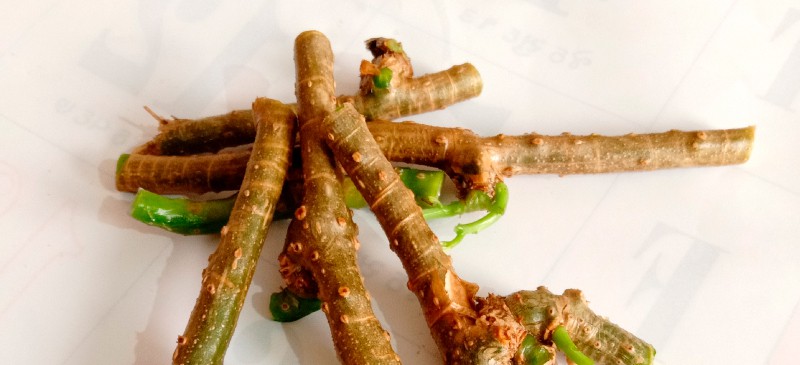
In Ayurvedic medicine, the herbal remedy made from the giloy plant — sometimes also called tinospora, giloe, guduchi or amrita — has been referred to as the “root of immortality.” In Hindi, Giloe is a mythological term that refers to the heavenly elixir that has saved celestial beings from old age and kept them eternally young.
What is the main benefit of giloy? This anti-inflammatory-herb is considered one of the best for boosting immunity against things like viruses, colds, infections, fevers and even some chronic diseases.
Recent research has shown that the giloy is high in a number of powerful antioxidants that help fight oxidative stress and free radical damage, which contribute to signs and symptoms of aging.
It’s no wonder then why giloy plants are abundantly grown and sold throughout India and China. They’ve even been used to help people suffering or recovering from viruses due to the plant’s ability to support respiratory, immune and heart health.
What Is Giloy?
Giloy (Tinospora cordifolia) is a type of shrub in the Menispermaceae plant family that grows stems, leaves and roots that are used in traditional systems of medicine, especially Ayurvedic medicine, which originated in India thousands of years ago.
Which part of giloy is used? Most often the’s plant stem is used to make remedies such as giloy powder and juice that’s made into capsules, tinctures, topical applications, “immunity shots” and herbal tea.
The root and leaves of the plant can also be used, but this is less common.
Nutrition
Studies have demonstrated that different parts of the giloy plant are full of antioxidants and phytochemicals, giving the plant the ability to help prevent and treat a range of conditions due to these compounds’ antimicrobial, antiviral, anticancer and antidiabetic properties. In fact, according to one research review, more than 200 different phytochemicals have been identified in Tinospora cordifolia.
Within giloy you’ll find some of the following active compounds and nutrients:
- Lignan fibers, including polysaccharides
- Steroids, including beta-sitosterol
- Diterpenoid lactones
- Sesquiterpenoid and phenolics
- Aliphatic compounds
- Terpenoids
- Glycosides
- Alkaloids, such as berberine and choline
- Lycopene
- Carotenes
- Polyphnolics, such as anthocyanin
Benefits
Here’s what research, plus many years of anecdotal evidence, tells us about potential giloy benefits:
1. Has Anti-Inflammatory, Antibacterial and Antioxidant Effects
Giloy is known to have anti-inflammatory, anti-arthritic and immuno-modulatory effects. This means it can help reduce symptoms like aches and pains, plus its antioxidants are helpful for protecting the eyes/vision, skin, heart, brain, liver and more.
Other traditional uses of this plant include treating:
- skin infections, such as scabies
- fevers
- coughs
- tonsillitis
- liver disease
- gout
- respiratory issues, such asthma
The lignans within giloy, which are types of protective fibers, also support gut health and seem capable of preventing the growth of some pathogens and fungi within the body.
2. Aids in Digestion and Detoxification
One of the most well-known giloy benefits is improving digestion and supporting liver function. It can be used to decrease or treat constipation, acid reflux, stomach bloating and other digestive ailments.
It also seems to enhance liver health and may help the body remove toxins, although more research is needed to confirm this. Additionally, there’s some evidence it can fight urinary tract infections.
3. May Help Manage Allergies and Asthma Symptoms
Taking powdered giloy capsules, chewing on the plant’s stem or juicing it can help people suffering from nasal allergies and asthma experience less trouble breathing, as well as other symptoms like chest tightness, shortness of breath, coughing and wheezing.
Giloy can also be used to support general respiratory health and help manage symptoms caused by common colds and coughs.
One study found that 83% of patients with nasal allergies experienced 100% relief from sneezing symptoms after using a giloy treatment, while 69% saw complete relief from nasal discharge, 61% from nasal obstruction and 71% from nasal pruritus.
4. Supports Metabolic Health
Because it has anti-inflammatory and hypoglycemic effects, giloy power and juice are sometimes used in traditional systems of medicine to help people with type 2 diabetes and high blood sugar levels manage their symptoms. It seems capable of supporting a normal insulin response, mostly demonstrated in animal studies, thereby reducing insulin resistance and blood sugar swings.
READ RELATED: How to live longer: Two small dietary tweaks that may have the biggest impact – expert tip
Some animal studies also show that this herb may help normalize cholesterol levels and lipid metabolism, which aids in cardiovascular health. This may be due to some of the compounds within giloy having a similar structure as cholesterol, which allows it to prevent some absorption of cholesterol.
5. Might Help You Cope With Stress
Giloy is considered to be an adaptogen in Ayurvedic medicine. This means it can help the body cope with stress and maintain hemostasis (or balance).
While there haven’t been studies proving this is true, some believe it can help support memory, has calming effects, can fight anxiety and can support normal production of stress hormones, such as cortisol.
Risks and Side Effects
Overall, giloy seems safe for most adults to take, however it does have the potential to interact with some medications and health conditions. It’s also not known if it’s safe to use giloy while pregnant or nursing.
Like with all herbal medicine, it’s important to stick to recommended doses to avoid side effects. If you take any medications, speak with your doctor and/or an herbalist before adding giloy to your routine.
Because it has the potential to lower blood sugar, you should be cautious if you have diabetes/insulin resistance or hypoglycemia and/or if you take any medications to manage your glucose levels. It can potentially make low blood sugar (hypoglycemic) worse, so it’s important to use it correctly to prevent side effects like weakness, fatigue, dizziness and fainting.
Giloy can also impact how your immune system works, so get your doctor’s opinion about using it if you have an autoimmune disease, like rheumatoid arthritis or inflammatory bowel disease.
How to Use (Dosage)
Because every giloy is processed a bit differently, always follow dosage recommendations and directions carefully for the specific product you’re using.
Here are general recommended giloy dosages depending on how you’re using it:
- Powder made from giloy stems: 2 to 6 grams/day in divided doses (usually equal to about 1/2 to 1 teaspoon or about 2–4 capsules daily). Children should be take lower doses, about 500 millgrams twice per day.
- Giloy juice: 2–3 teaspoons mixed with the same quantity of water, ideally consumed on empty stomach in the morning once a day.
Loo for dried giloy powder, capsules, tinctures, juice and topical ointments in health food stores that sell herbs or online. Juices and powders made from the plant’s roots and stems are usually mixed with water and diluted.
Here are some of the ways you can use this herb:
- Making giloy shots/tea — Try combining a small amount of giloy juice or powder with water (hot or cold), turmeric, ginger and black pepper to help support your immune system (plus some honey if drinking it cold if you’d like to improve the taste). Some people also use giloy powder mixed into milk with other anti-inflammatory herbs, such as turmeric, to reduce joint pain.
- Juicing the stems — Boil giloy stems for several minutes in water, then drain the liquid and keep it in the refrigerator.
- Applying it to the skin — Some dermatologists and naturopathetic doctors will prescribe lotions containing giloy to treat scabies and other skin problems. You can also purchase over-the-counter herbal creams containing this herb online. Additionally, try soaking a cotton ball in giloy powder and water and then applying it to skin to reduce inflammation.
Can I take giloy daily?
Most Ayurvedic herbs and adaptogen supplements are not intended to be taken daily long term. Rather, they’re intended for shorter periods of time, such as two to three months, to help people cope with illnesses and stress.
It’s best to initially use giloy for several weeks at a time before taking a break or for even shorter if you’re treating something like a fever or scabies.
Speak with an herbalist about using it for longer durations. Some herbalists may recommend consuming small amounts of giloy juice daily, but higher doses normally shouldn’t be taken for long periods of time.
Can it be combined with other herbs?
Yes, giloy is often used with other herbs and adaptogens to amplify the benefits. For example, it may be mixed with the Ayurvedic herb gymnema sylvestre, goldenseal, barberry or goldthread (all sources of the alkaloid berberine) to help manage blood sugar and insulin levels.
It can also be taken with other adaptogens such as ashwagandha to fight stress. Like giloy, these herbs are considered digestive aids, natural metabolic supporters, anti-inflammatory agents and liver tonics, so when used together in recommended doses they might have synergetic effects.
Conclusion
- What is giloy and its side effects? Giloy (T. cordifolia) is a shrub that is native to India and used in Ayurvedic medicine to make herbal remedies, including creams, tinctures and capsules.
- Giloy benefits include helping potentially treat skin infections like scabies, fever, allergies, asthma, digestive issues, high cholesterol and high blood sugar.
- Each herbal product containing giloy is processed a bit differently, so always follow dosage directions on the product label.
- Be cautious when using this herb if you have diabetes, hypoglycemia, an autoimmune disorder or if you’re pregnant.
Source:








